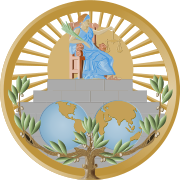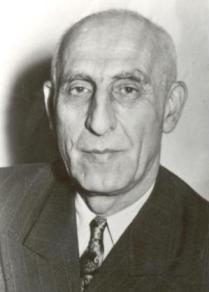
Mohammad Mosaddegh was an Iranian politician, author, and lawyer who served as the 35th Prime Minister of Iran from 1951 to 1953, democratically elected by the 16th Majlis. He was a member of the Iranian parliament from 1923, and served through a contentious 1952 election into the 17th Iranian Majlis, until his government was overthrown in the 1953 Iranian coup d'état aided by the intelligence agencies of the United Kingdom (MI6) and the United States (CIA), led by Kermit Roosevelt Jr. His National Front was suppressed from the 1954 election.

Sayyed Abol-Ghasem Mostafavi-Kashani was an Iranian politician and Shia Marja. He played an important role in the 1953 coup in Iran and the overthrow of Prime Minister Mohammad Mosaddegh.

The 1953 Iranian coup d'état, known in Iran as the 28 Mordad coup d'état, was the U.S.- and British-instigated, Iranian army-led overthrow of the democratically elected Prime Minister Mohammad Mosaddegh in favor of strengthening the monarchical rule of the shah, Mohammad Reza Pahlavi, on 19 August 1953. It was aided by the United States and the United Kingdom. The Shi'a clergy also played a considerable role.

The Anglo-Persian Oil Company (APOC) was a British company founded in 1909 following the discovery of a large oil field in Masjed Soleiman, Persia (Iran). The British government purchased 51% of the company in 1914, gaining a controlling number of shares, effectively nationalizing the company. It was the first company to extract petroleum from Iran. In 1935 APOC was renamed the "Anglo-Iranian Oil Company" (AIOC) when Reza Shah formally asked foreign countries to refer to Persia by its endonym Iran.
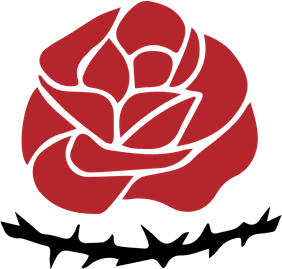
The Tudeh Party of Iran is an Iranian communist party. Formed in 1941, with Soleiman Mirza Eskandari as its head, it had considerable influence in its early years and played an important role during Mohammad Mosaddegh's campaign to nationalize the Anglo-Persian Oil Company and his term as prime minister. Tudeh became a pro-Soviet organization after the Iran crisis of 1946 and was prepared to carry out the dictates of the Kremlin, even if it meant sacrificing Iranian political independence and sovereignty. The crackdown that followed the 1953 coup against Mosaddegh is said to have "destroyed" the party, although a remnant persisted. The party still exists but has remained much weaker as a result of its banning in Iran and mass arrests by the Islamic Republic in 1982, as well as the executions of political prisoners in 1988. Tudeh identified itself as the historical offshoot of the Communist Party of Persia.

The Abadan Crisis occurred from 1951 to 1954, after Iran nationalised the Iranian assets of the BP controlled Anglo-Iranian Oil Company (AIOC) and expelled Western companies from oil refineries in the city of Abadan.

The National Front of Iran is an opposition political organization in Iran, founded by Mohammad Mosaddegh in 1949. It is the oldest and arguably the largest pro-democracy group operating inside Iran despite having never been able to recover the prominence it had in the early 1950s.

Ahmad Matin-Daftari, also known as Mo'in al-Dowleh, was an Iranian politician. He served as the former Prime Minister of Pahlavi Iran from 1939 until 1940.
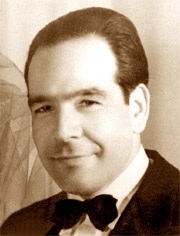
Hossein Fatemi was an Iranian scholar. A close associate of Prime Minister Mohammad Mosaddegh, he proposed nationalization of Iranian oil and gas assets. Initially a journalist, he served as minister of foreign affairs from 1951 to 1953. After the 1953 coup d'état toppled the government of Mosaddegh, Fatemi was arrested, tortured, and convicted by a military court of "treason against the Shah", and executed by a firing squad.

Hosein Alā was an Iranian politician who served as Prime Minister in 1951 and from 1955 to 1957.

Fadā'iyān-e Islam is a Shia fundamentalist group in Iran with a strong activist political and terrorist orientation. The group was founded in 1946, and registered as a political party in 1989. It was founded by a theology student nicknamed Navvab Safavi. Safavi sought to purify Islam in Iran by ridding it of 'corrupting individuals' by means of carefully planned assassinations of certain leading intellectual and political figures.
The Abadan Crisis was a major event in Iranian history. It began when the British Government invited themselves to the Middle East to look for oil, a resource that could not be found in their own land. Oil was discovered in commercial quantities in the southwest of Iran in May 1908. Although the oil did not belong to the British they claimed it as their own and forced the Abadani people to risk their own lives in oil refinery’s to collect it. The British then sold it to western countries, earning themselves millions of pounds and hiding the majority of the profits to the Iranian government and its people.

Tehran, Rey, Shemiranat, Eslamshahr and Pardis is a constituency for the Parliament of Iran encompassing the metropolitan area of Tehran and some of its satellite cities.

The nationalization of the Iranian oil industry resulted from a movement in the Iranian parliament (Majlis) to seize control of Iran's oil industry, which had been run by private companies, largely controlled by foreign interests. The legislation was passed on March 15, 1951, and was verified by the Majlis on March 17, 1951. The legislation led to the nationalization of the Anglo-Iranian Oil Company (AIOC). The movement was led by Mohammad Mosaddegh, a member of the Majlis for the National Front and future prime minister of Iran. The movement to nationalize the oil industry was the reaction to the following concessions made by Iran to foreign powers: the Reuter concession of 1872, proceeding letter,D'Arcy Concession?] the 1933 agreement between the Iranian government and AIOC, and the Gas-golshaian[?] contract. According to the political scientist Mark J. Gasiorowski, the oil nationalization movement had two major results: the establishment of a democratic government and the pursuit of Iranian national sovereignty.

The Iran Party is a socialist and nationalist party in Iran, founded in 1941. It is described as the "backbone of the National Front", the leading umbrella organization of Iranian nationalists established in 1949. The party's total membership has never exceeded the several hundred figure.
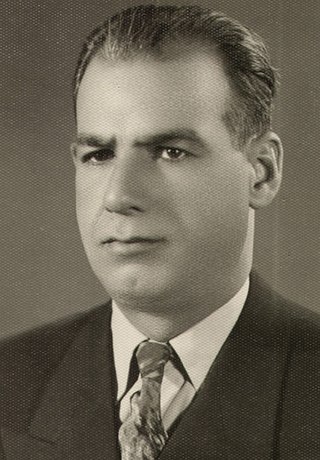
Seyyed Hossein Makki was an Iranian politician, orator and historian. He was a member of Parliament of Iran for three consecutive terms from 1947 to 1953.
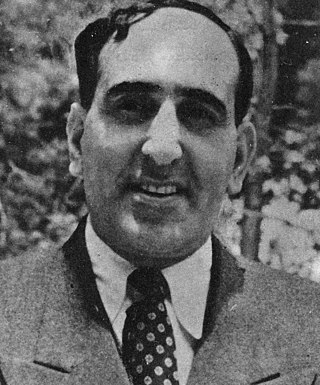
Abdullah Moazami was an Iranian lawyer and politician. He taught at University of Tehran and was a member of Parliament of Iran for four consecutive terms from 1944 to 1953. Moazami came from an upper-class and titled landlord family and has been described as a "man of moderate demeanor and connected with several factions by both family and politics".

Seyyed Abolhasan Haerizadeh was an Iranian judge and politician. He was a member of Parliament of Iran for three consecutive terms between 1921 and 1928 and another four consecutive terms from 1947 to 1956.

Seyyed Ahmad Razavi was an Iranian engineer and politician.
Ibrahim Alemi was an Iranian jurist and politician. He received his degree in law in France. He served as the minister of labour in the cabinet of Mohammad Mosaddegh between November 1951 and August 1953. The British officials described Alemi as the most loyal minister in the cabinet.
